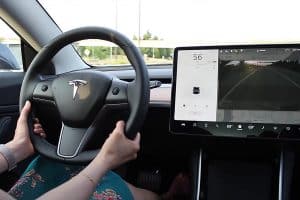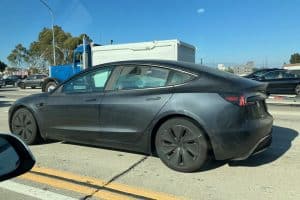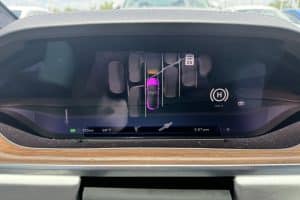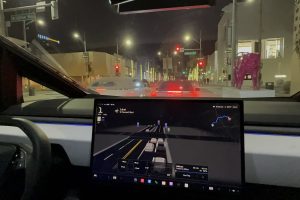- 🚗 Tesla China is preparing to test 10 FSD (Full Self-Driving) vehicles in Shanghai’s Nanhui New Town.
- 👨💼 The update was reported by Lu Sen, a director from the Shanghai Free Trade Zone Lingang New Area Administrative Committee.
- 📅 The specific date for the FSD pilot program’s commencement has not been disclosed.
- 🏢 In May, Tesla China was reported to be registering FSD with China’s Ministry of Industry and Information Technology (MIIT).
- 🎛️ Tesla has a data center in Shanghai to gather and store data from its fleet, complying with Chinese regulatory requirements.
- 🤝 During a recent visit to China, Elon Musk met with government officials, possibly discussing the FSD rollout.
- 🌍 China is the world’s largest auto market, offering a significant opportunity for Tesla’s FSD technology.
- 📈 Tesla’s large fleet in China, estimated at over 1.7 million vehicles, could provide valuable real-world data for improving FSD.
As the automotive industry inches closer to a self-driving future, Tesla continues to lead the charge. Recent reports indicate that Tesla China is taking significant strides towards deploying its Full Self-Driving (FSD) technology. This blog post delves into the implications of Tesla China’s latest FSD pilot program in Shanghai’s Nanhui New Town and explores what this means for the future of autonomous driving in the world’s largest auto market.
Introduction
The journey towards fully autonomous vehicles is a complex and multifaceted one, involving rigorous testing, substantial data collection, and stringent regulatory approvals. Tesla China’s recent initiative to test Full Self-Driving (FSD) vehicles in Shanghai signifies a monumental step in this journey. This blog post aims to provide a comprehensive understanding of this pilot program, its potential impact, and what it indicates about the future of self-driving cars.
The Announcement: A New Era in Autonomous Driving
Tesla China’s Ambitious FSD Test Tesla China has announced that it will be testing 10 FSD vehicles in Shanghai’s Nanhui New Town. This step is part of Tesla’s broader vision to bring fully autonomous driving to Chinese roads. The information was made public by Lu Sen, a director from the Shanghai Free Trade Zone Lingang New Area Administrative Committee, highlighting the growing collaboration between Tesla and local regulatory bodies.
Key Details
- Pilot Location: Shanghai’s Nanhui New Town
- Number of Vehicles: 10
- Source: Lu Sen, Director at Shanghai Free Trade Zone Lingang New Area
- Anticipated Launch: Date not disclosed yet
Regulatory Compliance and Data Collection: A Key Strategy
Registration with MIIT
In May, reports surfaced that Tesla China was taking steps to register its FSD technology with China’s Ministry of Industry and Information Technology (MIIT). This move was a critical precursor to starting the pilot project. Regulatory approval from MIIT ensures that the FSD technology complies with local standards and requirements, paving the way for its eventual public adoption.
Data Infrastructure
One of Tesla’s strategic advantages in China is its robust data infrastructure. Back in 2021, Tesla established a data center in Shanghai. This center is crucial for collecting and storing data from Tesla’s large fleet in China, which includes over 1.7 million vehicles. The data center not only supports Tesla’s FSD development but also ensures compliance with Chinese regulatory requirements for data processing and storage.
Elon Musk’s Influence and Future Prospects
During a surprise visit to China in late April, Elon Musk met with several key government officials, fueling speculations about discussions on the FSD rollout. Musk’s interactions with policymakers are pivotal for securing the support and approvals necessary for launching such advanced technologies. Furthermore, Musk’s optimism and proactive approach in meeting all data processing requirements underscore Tesla’s commitment to seamless and compliant operations in China.
The Market Potential: Why China?
China represents not just the largest auto market in the world but also one of the most competitive. The introduction of Tesla’s FSD technology in China could serve as a significant differentiator. The vast and diverse driving conditions in China provide an invaluable testing ground for refining FSD capabilities, potentially setting new standards in autonomous driving technology.
Leveraging Fleet Data for FSD Improvement
The Value of Real-World Data The extensive Tesla fleet in China serves as a rich source of real-world data. This data is critical for training and improving FSD algorithms, bridging the gap between lab simulations and real-world driving conditions. Each mile driven by these vehicles contributes to a deeper understanding of the complexities involved in autonomous driving, thereby enhancing the robustness and reliability of Tesla’s FSD system.
Data Utilization Strategy
- Data Collection: Continuous data gathering from the Tesla fleet
- Analysis: Processing and analyzing data to identify patterns and anomalies
- Implementation: Integrating insights into FSD software updates
Conclusion: Steering Towards a Self-Driving Future
Tesla China’s FSD pilot in Shanghai is more than just a technological endeavor; it’s a symbol of the future of transportation. As Tesla continues to break barriers and expand its capabilities, the successful deployment of FSD technology in China could herald a new age of autonomous driving, not only for Tesla but for the global auto industry.
As we continue to follow Tesla’s FSD journey, it’s clear that the road ahead is filled with exciting possibilities and transformative potential. With regulatory compliance, a strong data infrastructure, and strategic market positioning, Tesla is well-equipped to navigate the complexities of bringing fully autonomous vehicles to the mass market.
For further insights and updates on Tesla’s innovations in autonomous driving, stay tuned to our blog.





